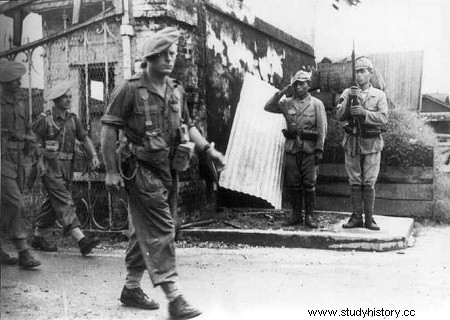
On August 6, Hiroshima, and on August 9, Nagasaki were destroyed by the first American atomic bombs, without France having really had it. time to define its Indochinese policy and prepare for it. It was only on August 17, under the pressure of events, three days after the Japanese capitulation, that a French High Commissioner was appointed in the person of Admiral d'Argenlieu.
It was therefore up to the French elements already on the spot, in Calcutta as in KouenMing, to “prepare for the most urgent matters”, as the metropolis recommended to us. But, in July, a decision had been adopted at the Potsdam conference to which France, which had not even been consulted, was a stranger and whose consequences were to prove disastrous for Indochina.
Under cover of distributing the surrender of Japanese units among the Allies, the S.E.A.C. of Admiral Mountbatten the Indochinese territory located south of the 16th parallel, while the north passed under the authority of the commander of the "China" theater of operations.
In other words, Tonkin, most of Laos and northern Annam fell back into the “Chinese zone of influence”. Chiang Kai Chek thus saw the promises obtained from Roosevelt come true.
The "friendly" Chinese troops, under the pretext of disarming the defeated Japanese, therefore entered northern Indochina... which will thus know two plagues instead of one!
In all this confusion, the Viet-Minh alone is ready to act. On August 7, he regroups his guerrillas into the “Vietnamese Liberation Army”, creates a “Vietnamese People’s Liberation Committee”, and, on the 10th, launches the order of general insurrection. All the device carefully put in place will come into action. As predicted by Ho Chi Minh, power is not even to be taken "because there is no more power".
Meticulously prepared by a systematic infiltrating of the administrations , the operation will be powerfully aided by the activists of the Japanese general staff, who, their army being reduced to impotence, are continuing their policy of liberating Asia from “white imperialism”; and it is not the least paradox of the moment to see this Japan, which has just capitulated, keep intact in Indochina (in Indonesia, the game will be the same) all its means
 intervention and subversion! Defeated Japan ensures that the mission it was set on is pursued by those who prove themselves most capable of it, regardless of their thoughts and real goals. Skilfully supported and carefully controlled by Kempetai agents, the Viet-Minh, in three days, was master of the situation.
intervention and subversion! Defeated Japan ensures that the mission it was set on is pursued by those who prove themselves most capable of it, regardless of their thoughts and real goals. Skilfully supported and carefully controlled by Kempetai agents, the Viet-Minh, in three days, was master of the situation.
On August 16, the Japanese general staff had transmitted to the " imperial delegate” the services of the general government, but the same day, he freed the Vietnamese political prisoners and on the 17th, supported by a demonstration of functionaries, the Viet-Minh substituted his red flag with a gold star for the imperial emblem.
On the 18th, the "imperial delegate" was forced to hand over power to a provisional management committee. On the 19th, the Viet-minh, to whom the Japanese delivered the arms of the Indochinese guard, was master of the city.
Emperor Bao-Dai, who had attempted, on the 20th, in speaking to President Truman, the King of England, Marshal Tchang Kaï Click and General de Gaulle, to have the independence of Vietnam recognized, decides to abdicate. On the 25th, in Hue, he presented two delegates of the Liberation Committee with the imperial seals, instruments of power, and signed his act of abdication while the red flag of the Viet-Minh appeared over the imperial city.
Everything was done so quickly and so perfectly that the population did not realize that in a few days, not to say a few hours, it had come under the authority of the Viet Minh League.
As for France, its representatives in Indochina, prisoners or neutralized by the Japanese, helplessly witnessed this upheaval. Those who, outside, in Calcutta or Kouen-Ming, like me, are waiting for the moment, in the name of the G.P.R.F., to assert the rights of France in Indochina, redouble their efforts to gain Indochinese territory. As soon as the announcement of the Japanese capitulation, administrators or soldiers destined to take over were parachuted from Calcutta; but many are captured, even massacred, by the Vietnamese. Some will survive in the maquis, but will find it impossible to act.
At Kouen-Ming, I had. made the decision to launch towards Hanoi all our commandos positioned along the Sino-Tonkinese border. The first, the commando of Lieutenant Blanchard, embarked on two navy patrol boats, set foot on the 15th in Haiphong, creating a deep wavering in the population, impressed by these units flying the French flag but a few days later, Blanchard and his companions are taken prisoner by the Japanese.
For me, my decision to reach Hanoi as a matter of urgency immediately came up against Chinese and American opposition. It's only August 22. after more than a week of negotiations and negotiations, that I obtain that a plane be made available to me; but officers of the O.S.S. are attached to my steps.
